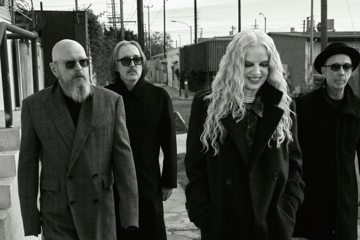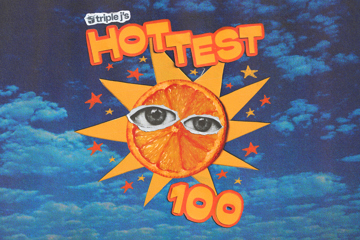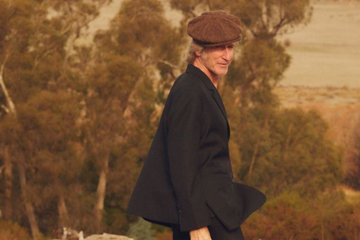Will Ferrell and Kevin Hart's 'Get Hard' Falls Short
'Listen Up Philip' staring Jason Schwartzman saves the day
GET HARD

Get Hard, a comic collision between leading-men Will Ferrell and Kevin Hart, has already met with plentiful criticism. Where ethnic stereotypes were once a bedrock on which comedy could comfortably rest, the changing cultural climate means that, in 2015’s era of Twitter outrage, a film in which a black man coaches a white man on how to survive in prison has been met with plentiful public accusations of being racist and homophobic.
The latter is pretty easy to dismiss; given the film’s great fear —that old comic chestnut: being fucked in the ass behind bars— is less a fear of homosexuality, more a fear of rape (and no one’s ever gotten mad about rape jokes on the internet, right?). There’s plenty of comic mileage milked from gags that toe the line between eager homoeroticism and adolescent-male gay-panic; with numerous jokes revolving around anal insertion, and a lodged-in shiv is its own symbolic penetration.
Don't miss a beat with our FREE daily newsletter
As for race, that’s a different conversation. Get Hard totally abuses stereotypes: the cholo hood, the black thug, the prison faggot. Its definitive scene finds Hart scurrying back-and-forth around Ferrell, play-acting a host of prison clichés. Ferrell plays another in his long line of man-child buffoons, blithely living out his white male privilege in the face of changing social values. He lives in a towering castle with his materialist trophy wife (Allison Brie), surrounded by a cadre of Latino house staff. He lectures Hart (who Ferrell incorrectly assumes is a thug, when he’s actually a different stereotype: “a Cliff Huxtable-looking pussy motherfucker”) on fiscal responsibility and not “asking for handouts”, and looks up to his father-in-law (Craig T. Nelson), a ‘self-made man’ who got his hedge-fund firm off the ground with just a bit of elbow grease and an $8mil loan from his family trust.
Director Etan Cohen and the cadre of writers (Jay Martel, Ian Roberts, longtime Ferrell partner Adam McKay) are playing with class satire: its opening credits showing split screens in which brunching white-collar titans are juxtaposed with shots of homeless people rifling through bins for breakfast; its most trenchant sequence comes when Ferrell teaches a street-gang about high finance, each enterprise criminal to its core (“the stock-market is gangsta: take what’s yours and fuck the other guy”). Of course, when Ferrell ‘dresses gangsta’, it reminds you of those lead-balloon jive-talkin’ jokes from Anchorman 2: The Legend Continues, which were so bad they were cut out of the video version.
Ultimately, Get Hard is a film in which the homoerotic tone is leant on for most of the laughs. Ferrell and Hart’s partnership is played to the beats of a rom-com romance (there’s even a secret to be spilled at the end of the second act, ruining their budding union), a cameo-ing John Mayer gets in on the getting-fucked-in-prison jokes, and, inevitably, even the movie’s title is revealed to be an extended riff on tumescence. That doesn’t make the film racist or homophobic, but it doesn’t often make it funny, either.
THE DUFF

“What happens in high-school is going to stay with us forever,” pronounces Bella Thorne, the cunt-ish Queen Bee of The DUFF, speaking aloud the fear percolating through every teen-film set in the mythical high-school of the movies. Its title is an acronym —the Designated Ugly Fat Friend— the story takes at face value: such skin-deep judgmentalism part-and-parcel of the adolescent experience. ‘Hey, all teenagers are cunts’ seems to be its semi-justifying rationale for this grotesque premise; but, sadly, the cunts here are not as winningly cunty as the cunts of teen-film legend (see: Heathers, Mean Girls, etc.).
 Mae Whitman is dubbed a DUFF in this materialist world, not as “hot” as her two best friends (Skyler Samuels, Bianca A. Santos), characters so underwritten and forgettable they wear nameplate necklaces so we can remember who’s who. The DUFF, in a semi-endearing way, goes all in on every teen-movie trope: voice-overs explaining social standing; riotous house parties; wearing goggles and dropping things in coloured-liquid-filled beakers in chemistry class; a deal in which a geek and a jock trade tutoring for a make-over; that make-over begetting a popping-out-of-the-dressing-room-in-different-outfits montage.
Mae Whitman is dubbed a DUFF in this materialist world, not as “hot” as her two best friends (Skyler Samuels, Bianca A. Santos), characters so underwritten and forgettable they wear nameplate necklaces so we can remember who’s who. The DUFF, in a semi-endearing way, goes all in on every teen-movie trope: voice-overs explaining social standing; riotous house parties; wearing goggles and dropping things in coloured-liquid-filled beakers in chemistry class; a deal in which a geek and a jock trade tutoring for a make-over; that make-over begetting a popping-out-of-the-dressing-room-in-different-outfits montage.
And it doesn’t just borrow from teen-movies, but cult comedies: Ken Jeong just walks straight in from Community, still in character; and when Whitman goes all in on Marlon-Brando-by-way-of-Lisa-Simpson rebellion, the film just straight plays Joan Jett’s Bad Reputation, forever the theme-song to Freaks & Geeks. A teen film informed by Freaks & Geeks would be amazing (actually, it already is: watch The Myth Of The American Sleepover, the sweet, melancholy last-weekend-of-summer-holidays movie David Robert Mitchell made before his awesome horror-art-piece, It Follows), but, instead, The DUFF seems mostly informed by She’s All That.
There’s the obligatory millennial wrinkles —a friendship breakup = defriending/unfollowing on the whole social-media inventory; mass public humiliation happens via viral video— to bring The DUFF up to contemporary speed. But the bet-turns-to-actual-love tale of Whitman ‘unexpectedly’ falling for womanising football stud Robbie ‘Freddie Prinze Jr. Jr.’ Amell is as old as time itself.
While We’re Young

Ben Stiller and Naomi Watts are a Brooklyn couple in their early 40s; aging artists (he’s a documentarian, she a producer) whose friends are all having babies. When a 20-something couple of aspiring documentarians, Adam Driver and Amanda Seyfried, blow into their life, bringing youthful enthusiasm with them, it’s a brief of fresh air; a source of inspiration that revitalises their sense of spirit, their creativity, and both their individualism and their relationship.
At first, it seems like Noah Baumbach is making an affectionate portrait of artistic inspiration, of new friendship, of the subtle differences between gentrifying generations in the borough that serves as hipster mecca, of what it means to be an adult in a culture in which the traditional mores of adulthood have fallen away. There’s a sense of real, human truth at play in its portrait of new parenthood; in how Stiller and Watts feel a stasis (the only two feelings Stiller has left, he says, are “wistful and disdainful”), whilst their breeder friends (Maria Dizzia and Adam Horovitz) find their lives transformed. Horovitz —ex-Beastie Boy and Kathleen Hanna’s husband— is great in what amounts to his first real film role; shining as a full-time father who hasn’t found enlightenment through parenthood.
Driver, of course, is great, as always; though it’s actually more fun watching him bring the amazing to more generic films (What If/The F Word is a straight-to-video-grade rom-com turned sheer delight whenever Driver is on screen, for example). He plays a character who is a walking contradiction; every line a mix of sincerity and insincerity, joviality and menace, selfishness and selflessness. If While We’re Young were allowed to be a character study, his character would be the one most worth of study.
But it’s not allowed to be. After a charming beginning, Baumbach’s screenplay unexpectedly —and ill-advisedly— takes the plunge into genre, becoming a kind of paranoia-thriller born out of (what else?) Stiller’s Jewish neuroses and aging-male insecurities. “The world isn’t a conspiracy against you,” an annoyed Watts sighs, with a roll of her eyes; but, then, the film wonders: what if it really is? What if these cool kids aren’t friendly and fun, but schemers out to steal what’s yours?
If this were the Sundancey work of some American-indie debutante, you might take this detour into shittiness at face value; noting that, in the US film system, even the most mumblecore of set-ups can get punched up with only-in-the-movies tropes. But because Baumbach has a career of thoughtful, smart films behind him (Kicking & Screaming, The Squid & The Whale, Margot At The Wedding, Frances Ha, etc), you start to wonder: is this shittiness accidental or deliberate? Is this, perhaps, some kind of Adaptation.-esque meta-movie monkeyshines, where the entire film transforms into a bad genre movie as commentary on the conversation on art-making therein?
It’s no coincidence that While We’re Young gives us three generations of documentary-makers, with Charles Grodin as Watts’ Direct-Cinema-don dad, a titanic filmmaking figure resented by Stiller, worshipped by Driver, and due for a career retrospective. The climax of the film finds Grodin delivering his retrospective speech, heralding the virtues of vérité, of using the moving image in pursuit of truth. Yet, this climax comes after half-an-hour of straight silliness, in which the domestic truths of its first act are pissed away for something patently ‘unreal’.
Perhaps this is Baumbach’s commentary on the millennial tendency towards falsity; where daily life is documented so constantly that people’s lives become ongoing works of performance (“if everyone is filming everything, what’s a documentary?” Stiller spits at Driver). But, then again, the story ends with a pat, One Year Later conclusion torn from a crap rom-com, and essentially forwards the moral ‘Don’t Make Friends With Young People!’, hardly the work of subtle commentary. Faced with such, I’ll probably have to accept that ideas of Trojan-shitty meta-movie subterfuge elaborate coping mechanisms; a way of attempting to make conceptual sense of a film that starts out so great, then goes so off the rails.
Listen Up Philip

If you’re into films about horrible people, does Alex Ross Perry have a film for you. Fresh off The Color Wheel —a no-budget roadtrip movie about a pair of siblings so loathsome, the only people who can stand them are each other— Perry gives us Jason Schwartzman in his most Schwartzmanish role: as a breakout New Yorker novelist who’s petty, self-centred, obnoxious, abrasive. “I know, what an asshole!” he smirks at a photographer after refusing to be photographed near a printing press, proving himself the worst kind of dick: one who’s aware of his dickishness, and wields it like a weapon.
 Emboldened by the acclaim for his second novel, Schwartzman (the titular Philip) embraces his every egotistical impulse, starting with refusing to do any press for the book. “That’s a horrible, horrible idea,” says his publisher (Old Joy’s Daniel London), with an exasperated sigh, immediately identifying the writer as “a baby and an asshole”, petulant to the point of self-sabotage.
Emboldened by the acclaim for his second novel, Schwartzman (the titular Philip) embraces his every egotistical impulse, starting with refusing to do any press for the book. “That’s a horrible, horrible idea,” says his publisher (Old Joy’s Daniel London), with an exasperated sigh, immediately identifying the writer as “a baby and an asshole”, petulant to the point of self-sabotage.
But Schwartzman finds an immediate ally in his egomania, when an old literary lion (Jonathan Pryce, getting his Roth on) takes him under his wing, schooling him in the arts of self-made man-of-letters mythos and being a cantankerous prick. Schwartzman moves into Pryce’s summer house, where he meets his mentor’s pissed-off, depressed daughter, Krysten Ritter (“I don’t find you charming,” she deadpans, “you’re just like him”), attempts to charm an old flame (recurring Perry collaborateur and mumblecore muse Kate Lyn Sheil), and eventually lands a teaching job at a local upstate college, where he attempts to live out the cliché of having a French girlfriend (Joséphine de La Baume, aka Mrs. Mark Ronson).
Were this simply a film about one amusingly-antagonistic prick, though, Listen Up Philip would have its limits. But in a piece of radical structural storytelling —inspired, Perry says, by William Gaddis’s The Recognitions— midway through the film we abandon Schwartzman entirely, and pick up, instead, with the girlfriend he’s left behind in New York. With Eric Bogosian’s omniscient voice-over taking us deep into her feelings, we follow Elisabeth Moss as she tends to the tract of scorched earth Schwartzman’s left behind.
With the same sort of episodic charm, we find her visiting her sister (Jess Weixler), selling all Schwartzman’s stuff in a stoop sale, riding her bike through Brooklyn, buying a cat. If Perry specialises in making films about assholes, Moss plays a far more sympathetic human, detoxing from a stint spent in asshole orbit. And she’s great, too, bringing life and depth to a role that tilts the film on its axis. Listen Up Philip will be hailed for its sharp, incisive writing, and for its horrifying portrayal of alpha-male foibles, but, when it alights with Moss’s character, it becomes something far more complex and interesting.
SAMBA

Samba is made by the same dudes, Olivier Nakache and Eric Toledano, who made the insufferable, awful crowdpleaser malarkey The Intouchables. It reunites them with Omar Sy, and attempts to mount a more meaningful, topical drama: Sy playing an illegal Senegalese immigrant who, though having lived in Paris for a decade, lives in fear of being sent back home, his life a procession of shitty cash-in-hand jobs and different assumed identities. His path crosses with Charlotte Gainsbourg, a fried, overtaxed corporate drone on an extended-leave stint of ‘recuperation’, volunteering at an immigration-law office. They, of course, fall for each other; and, oh, This Time It’s Personal, etc.
Whilst Samba dabbles in trenchant 21st-century themes, and isn’t as awful as The Intouchables, it’s hard to anoint it as anything beyond its own mugging misfire. Aside from all the moments of skin-crawling ‘comedy’ —Tahar Rahim as an Arab immigrant pretending to be Brazilian to get the girls; an office party that involves everyone dancing to Bob Marley— the film takes it as a given that audiences will want nothing more than to see Sy and Gainsbourg end up together, and for him to be able to stay in France permanently. When that involves the morally-horrifying choice to kill off and/or send away other characters to help our lovers, Samba’s apparent issue-movie sensitivity effectively dies on impact; this yet another film that pulls a quick U-turn from tragedy to feelgood on close so, it assumes, audiences can leave the cinema with a spring in their step.







